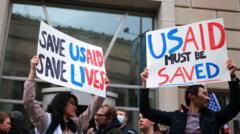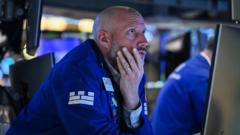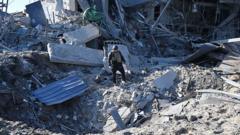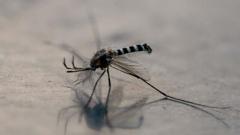The World Health Organization (WHO) reports that fifty countries are feeling the effects of the US government's freeze on funding from USAID, severely disrupting critical health services for diseases like HIV and polio. The WHO chief urges a reconsideration of this freeze to alleviate the situation.
Global Health at Risk as USAID Funding Frozen, WHO Warns

Global Health at Risk as USAID Funding Frozen, WHO Warns
A stark warning from the WHO highlights the severe global health implications of the US government's freeze on international aid, impacting vital healthcare programs.
The World Health Organization (WHO) recently reported that the United States' freeze on funding from the United States Agency for International Development (USAID) has severely affected healthcare programs in fifty countries. WHO Director-General Dr. Tedros Adhanom Ghebreyesus expressed grave concern during a virtual press briefing from Geneva, drawing attention to the negative impacts on essential services, including HIV treatment, testing, and prevention efforts.
President Donald Trump's administration has justified the freeze by arguing that USAID's expenditures are "totally unexplainable." This decision has led to halted operations for programs such as the President's Emergency Plan for AIDS Relief (PEPFAR), causing significant disruptions to health services globally. "Clinics are shuttered, and health workers have been put on leave," Dr. Tedros asserted, highlighting the dire consequences of the funding freeze.
Multiple experts in global health are sounding alarms over a potential spike in disease cases and the delays in vaccine and treatment development that could follow. The situation is particularly alarming in the Democratic Republic of Congo, where humanitarian efforts are feeling the strain.
Trump's administration has recently escalated cuts to USAID, which administers nearly $40 billion in humanitarian aid—representing a mere 0.6% of the total U.S. government budget. These funds are critical for supporting health initiatives primarily in Asia, sub-Saharan Africa, and Europe, with significant allocations directed toward humanitarian efforts in Ukraine.
Tech mogul Elon Musk has vigorously backed Trump's claims against USAID, labeling it as a "criminal organization," although neither he nor Trump has substantiated these allegations with solid evidence.
Further complicating the matter, President Trump has pursued withdrawing the United States from the WHO, which was previously a leading contributor under the Biden administration, responsible for nearly 20% of the organization’s budget in 2023. Dr. Tedros warned that this withdrawal could diminish international cooperation on crucial global health issues.
To mitigate shortages exacerbated by the aid freeze, the WHO has implemented emergency measures akin to those activated during the Covid-19 pandemic. Meg Doherty, WHO's director of global HIV, hepatitis, and STI programs, indicated that coordination efforts for sharing essential medications between nations are underway. However, she emphasized the necessity for a more sustainable, longer-term solution to address this health crisis effectively.



















